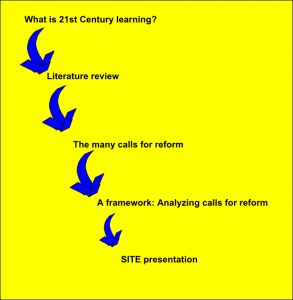An Almost Final Reflection
During the past 12 months I have been on a journey of sorts, an experience, a seeking, an attempt to make meaning. What have I been seeking? The answer to the question “What is 21st century learning?” This journey started after seeing and hearing the term “21st Century Learning,” or one of its analogs (21st century schools, schools of the future, etc) many times while completing Masters of Educational Technology courses at University of British Columbia.
 Originally I planned to create a literature review of literature critiquing the major 21st century learning proponents, but found little of substance (albeit with a non-exhaustive EBCSO search) in the literature.
Originally I planned to create a literature review of literature critiquing the major 21st century learning proponents, but found little of substance (albeit with a non-exhaustive EBCSO search) in the literature.
Next I examined the major calls for reform: from think tanks, educational associations, and industrial consortia and saw a need for a method to analyze these numerous reform calls for their educational value.
From there I developed the beginnings of a framework to perform that analysis, drawing upon reform calls, classroom experiences, literature and personal experiences, which I presented at SITE 2012. I also created a media presentation on my framework, embedded below.
A number of questions remain unresolved. I still am unclear on what 21st century learning is (or should be). The question of how reforms should be implemented is unclear, as is how the school system can afford many of the reforms being called for.
In my mind, many of the reform calls have some merit, but one, P21, stands out. P21 has the most comprehensive package, involving revised curriculum, teacher education and changes to school’s structure and organization. The major failing of P21 is in not addressing the affordability of their plan, and to not foresee the explosion of mobile devices such as iPod Touch and smart phones.
Digging deeper into 21st century learning reveals more that is unknown, more that is unclear, and it reveals that academics and researchers are not all looking in the same direction or with agreement on what is best practice. Although constructivism is currently the methodology being touted as most effective and efficient, in my personal experience, it is not being supported by teacher unions, school structures, district administration, and governments. Perhaps governments are resistant to changes that are perceived as having less accountability and perhaps teacher unions are resistant to changes that are perceived as decreasing teacher’s influence in schools.
At least two things became evident during this journey. The first is that while there are definite changes to societies attitudes towards technology, evident, for example, by world wide usage of cell phones, educators are slow to adjust their practice and make use of new technology. The frequent, simplistic “education” solution is to ban new technology, whether it is the cell phone, Wikipedia, or game consoles, from school, a short sighted and reactionary method of dealing with technologies that are not fads and are not about to go away any time soon. I believe schools need to embrace new technologies and to adjust educational practice to take advantage of the vast, rich affordances of many of the new technologies. For example, instead of banning cell phones, engage students in discussions on ethical and good social habits of cell phone usage, require students to use cell phones in class, adjust the tasks, assignments and learning outcomes to acknowledge and reflect the power of the cell phone as a learning tool.
The second item that became clear to me is that educational experts will never agree completely on what is the best educational system. Since there are vastly different concerns in education, from improving the literacy rates in third world countries, improving school completion rates in inner cities, to increasing university readiness of students in college preparation schools, there is likely no one best system. What there should be, however, is an agreement on the purpose of school and what “being educated” means. Right now there is conflict between many 21st century school reform advocates and current curricula, required practices, and standardized testing. I believe governments are going to need to make changes to curricula, required practices and standardized testing, all items which were put into place because lawmakers perceived the need for them at the time they were enacted, before educational systems can move forward. For governments to be given the impetus to make those changes the public need to be more informed about effective and efficient educational practices, perhaps needing to realize that test scores are a poor measurement of how well educated a person is.
As this journey draws to a close, I pause and reflect upon the journey itself and not just where it took me, and realize that a lot of learning took place on my part. From refining searching skills and improved synthesis, to a deeper understanding of the research process and gaining improved well-roundness, the journey reinforced the richness a large educational project can impart on the learner. I was humbled by my naivety, encouraged by my understanding, delighted by my accomplishments, and enriched by my interaction with the problem. All in all, I feel the journey was memorable and successful, the learning monumental, and the experience unlike any other in my life long learning.
Maurice Last
April, 2012.
